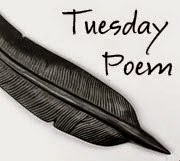“I just want one more summer,” my father said
as he lay upon his winter bed
and I held his hand as though
I could prevent him from slipping away.
“I love you, Dad,” I said though I could scarce
force the words from a throat scratched with tears.
He had no such trouble.
Liberated by the shadow of time
from the verbal prison of his generation
he said: "I love you too. I love all my sons very much."
Four sons. You could say he had sired
enough pallbearers.
The son born by the father, the father borne by the son.
Such is the circle.
I held his hand,
once the outrider of his vitality,
now purpled by cold and blotched with age
and I thought about the history of that hand,
meting punishment, giving guidance,
saving my life on more than one occasion.
That hand had never wavered
in the duty of its love.
I held your hand, my father,
and I thought of all I longed to give you
like grandchildren
and achievements worthy of
bowling green braggery.
But most of all
I wanted to open my hand
and find there
one more summer
to give you
before you go to where
I hope it is always summer.
The poet wishes to acknowledge Valley Micropress in whose pages this poem first appeared.








